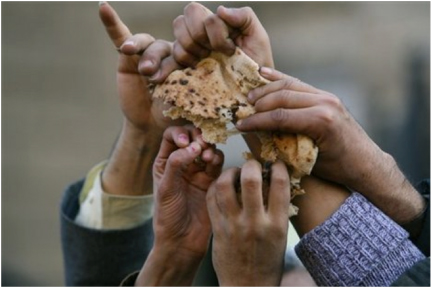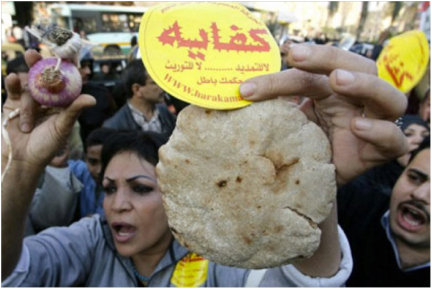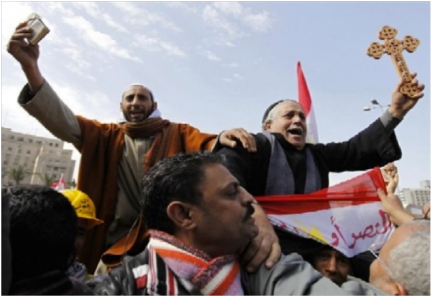
by el-Sayed el-Aswad, United Arab Emirates University
The word “Breadom†is not a spelling mistake; rather it is a combination of the words “bread†and “freedom†indicating, respectively, the “body†and “soul†of the Mother of the World (umm ad-duniya, Egypt), which is currently being affected by a novel form of revolt. In the bread uprising of January 18-19, 1977, falsely depicted by Sadat as “the uprising of thieves†(intifada haramiyya), Egyptians, especially the poor, were interested in securing the ‘bread of their livelihood’ (luqmat al-‘aysh), while in the revolt beginning on January 25th, 2011, they showed profound interest in both bread and freedom. The Arabic word “‘aysh†means both “bread†and “life or living.†These two inseparable meanings have made the phrase “‘aysh al-huriyya†(life of freedom) the best iconic gift crafted, engraved and offered, through victorious young Egyptians of victorious Cairo (al-Qahira), in the Freedom Square (Tahrir Square) opening a new chapter of Egyptian (Arab) history.
It is not surprising to hear people in Tahrir Square, directing their chanting to the government and its businessmen, shout forcefully, “thieves, thieves, thieves†(haramiyya). Also, there was a phrase written in huge letters on the ground of Tahrir Square that says “catch a thief†(imsik haramy). Such phrases resonate and reverberate in the Egyptian folk saying, “its guard is its thiefâ€, (hamiha haramiha), with reference to a plundering and deceitful governor.
Away from the regional conflict of the Middle East, the relationship between Egyptian grassroots and elites has been affected by the political and economic transformations (from feudalist, to socialist, to capitalist systems) that have occurred in Egypt’s modern history. The majority of businessmen or new elites, allied to prominent statesmen, benefit as power oriented brokers who gained wealth in the short time during the initial period of al-infitah (open-door policy) and are depicted as ‘fat cats’, (al-qitat al-suman). Unfortunately, the economic open-door policy has turned out to be “open-door policy of corruption†(infitah al-fasad). The manipulative elites or ‘fat cats’ have taken advantage of both the state and its people. As recounted by the folk, they never acted mercifully or with loyalty toward the people, but rather abused them and “sold the country (ba‘u al-balad)†through privatization. As for being linked to globalization, the privatization policy that gives the private sector unprecedented priority to the public sector has had grievous impact on the educational, social, and health services offered to poor Egyptians in general and rural Egyptians, especially women and children. The open-door policy has been restricted to the economy, excluding political life or parties. Egypt’s national interest has been turned over to businessmen for the elites’ self-interest. Further, it is illogical and unethical that an Egyptian university professor uninvolved in the corrupt system is paid $200 a month, while another University instructor, serving the corrupt government or/and privatized education, is paid more than $10,000 a month.

Egyptian history is rich with examples that display peoples’ diplomatic strategies in dealing with manipulative elite. They use all possible means in order to improve their social and economic positions. These means range from dialogue and diplomacy to resistance and revolts. One of the most pivotal principles that guide the folk in their relationship with powerful elites is patience (sabr). The folk saying, “to be patient with the devilish neighbor is to wait till he departs (yarhal), or a misfortune (dahyia) afflicts him†is frequently used in situations in which silence or non-violent action is the most suitable option. This folk proverb offers insights to the command (order) form of the word “depart†or “leave†(irhal or rahala) addressed to the Egyptian president.
Egyptians employ various metaphors such as kusa (zucchini), qar‘ (pumpkins), humar (donkey), baghl (mule) among others, to convey their peaceful strategy as well as to express their attitude toward oppressive elite. As zucchini and pumpkins differ in size and weight, elites also differ in influence and position. Kusah kabirah (big zucchini) is a phrase used by the Egyptians to denote a high ranking official or a very influential person (such as the local elite representing the people in the National Assembly). Kusah is associated with notions of hierarchy and power in the sense that those who are relatives of or have connections with big men have kusah kabirah and are more privileged than others who do not. Both people of zucchini and pumpkins (kusa and qar‘) represent corruption.
The donkey and mule are used as folk genres or themes of irony in Egyptian folklore connoting foolishness and contradiction. For instance people say, “we have been quiet with him (the intruder), but he hacked into us (crossing the threshold) riding his donkey†(sakatna lahu dakhal bihumarahu). This is applicable to the incident in which thugs, supporting the government, stormed into Tahrir Square riding mules, horses and camels in a bizarre and foolish manner. The shark, called samak al-qirsh, literally means the “piaster fish†and has been used to refer to those who are greedy and obsessed with money. The whale (al-hut) is also used for the big person who swallows the smaller ones. I heard that there has been a ‘sugar whale’ (hut al-sukkar) monopolizing the sugar market in Egypt for a decade. More and more, metaphors such as these are being heard with reference to the current situation in Egypt.
Lacking a sense of social responsibility has caused corruption and immoral actions that can be seen as harming not merely local communities but the entire country. The new business elites are careful to spatially remove themselves from the body of the poor. They have failed to live up to their responsibilities. To put it succinctly, by being remote and away from peoples’ immediate problems, those elites have had very limited impact on social relations and networking, virtual and actual, at the local and national levels. Young Egyptian people, born after the 1977 bread riots, however, have shown that they are not immature users of the Internet and Facebook, but rather serious, innovative and assertive in using cyber circulation for the purpose of social and political awakening.
A young Egyptian recounted, “Yes, we are poor, but we have dignity. We are not asking the government or the wealthy to give us charity, but we demand our right to have reasonable incomes, health care, clean water and well equipped schools.†In his response to a question I addressed regarding a solution to this problem, Shakh Hamid emphasized that, “there is no islah, social, economic and political reform, without salah, righteousness,†which builds people from within to establish inner moral resources for their conscience and which helps them make appropriate choices. The solution, he felt, thus, lies in the people’s capacity to make moral choices. These choices have been done by Egyptians, Muslims and Copts together, in January 25 through February 10, 2011, glory to Egypt, “‘azima ya misrâ€.

When I saw people praying collectively in Tahrir Square amidst the chaos, I was assured that the steadfast belief in a divine higher power, surpassing any other power, provides an unlimited source of emotional, spiritual and socio-political empowerment. The departure of Mubarak’s corrupt political system is a beginning in the victorious march of Egyptian (Arab) freedom (‘aysh al-huriyya).